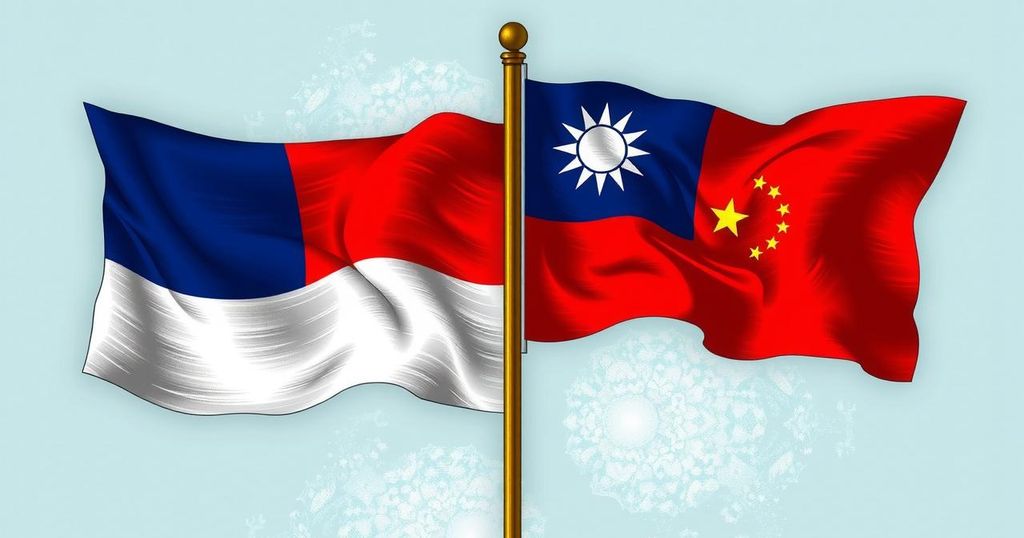Paraguay remains committed to its diplomatic ties with Taiwan despite pressure from China, highlighted by the expulsion of Chinese diplomat Xu Wei. Paraguay is the only South American nation still recognizing Taiwan, which China seeks to change. The Paraguayan government reaffirmed its allegiance to Taiwan, even as it explores opportunities with China, showcasing resilience amid geopolitical tensions.
The diplomatic relations between Paraguay and Taiwan remain steadfast amidst growing pressure from China. This situation has been exacerbated by the expulsion of Chinese diplomat Xu Wei, who sought to influence Paraguay’s foreign policy by urging it to sever ties with Taiwan. Paraguay is the last South American nation to officially recognize Taiwan, a status that China is actively attempting to change. Xu, attending a meeting in Paraguay, indicated that the country must decide between aligning with China or continuing its relationship with Taiwan, downplaying the benefits of Taiwan’s support for Paraguayan exports like soy and beef.
In response, the Paraguayan government promptly declared Xu persona non grata and revoked his visa, accusing him of meddling in internal affairs. The Paraguayan Ministry of Foreign Affairs reaffirmed its dedication to maintaining solid relations with Taiwan, despite the increasing diplomatic pressure from Beijing. The embassy of Taiwan in Paraguay condemned Xu’s conduct, labeling him as an “infiltrator” aimed at disrupting their 60-year alliance.
Furthermore, Taiwan has taken steps to enhance its partnership with Paraguay by providing practical assistance, including the recent donation of 30 electric buses. These buses are part of a larger initiative aimed at modernizing Paraguay’s public transportation system and minimizing its carbon emissions. The Taiwanese manufacturer, Master Bus, is set to deliver these buses in February 2025 as part of a plan to introduce a total of 1,000 electric buses in the upcoming years, fostering both diplomatic and economic collaboration.
The enduring diplomatic relationship between Paraguay and Taiwan, forged in 1957, has been characterized by extensive agreements in trade, culture, and development assistance. Despite the significant economic pull of the People’s Republic of China, particularly in relation to soy and beef exports, Paraguay has historically leaned towards Taiwan due to the development aid and financial support it has received. The political dynamics of this partnership have remained complex, especially in light of Paraguay’s historical shifts in governance and presidential transitions in the 21st century.
Despite external pressures, Paraguay maintains its commitment to Taiwan, even as it explores economic opportunities with China, illustrating the broader geopolitical contest concerning Taiwan’s international standing. This situation places Paraguay at the forefront of a significant diplomatic struggle, underscoring its resilience in the face of growing Chinese influence.
The article addresses the current status of Paraguay’s diplomatic ties with Taiwan amidst increasing Chinese pressure. Paraguay remains committed to maintaining its long-standing relationship with Taiwan, despite attempts by China to influence its foreign policy. The expulsion of Chinese diplomat Xu Wei highlights the tensions over this subject while illustrating Taiwan’s continued support to Paraguay through developmental assistance. The article traces the history of Paraguay-Taiwan relations, emphasizing the significance of their partnership against the backdrop of China’s increasing economic influence in the region.
In conclusion, Paraguay’s diplomacy exemplifies a commitment to its historical relationship with Taiwan, resisting pressures from China to alter its foreign policy stance. The expulsion of diplomat Xu Wei denotes Paraguay’s defiance against interference, while Taiwan’s ongoing support further solidifies this alliance. As China intensifies its efforts to isolate Taiwan internationally, Paraguay’s resilience serves as a crucial point in this global diplomatic conflict.
Original Source: www.intellinews.com







